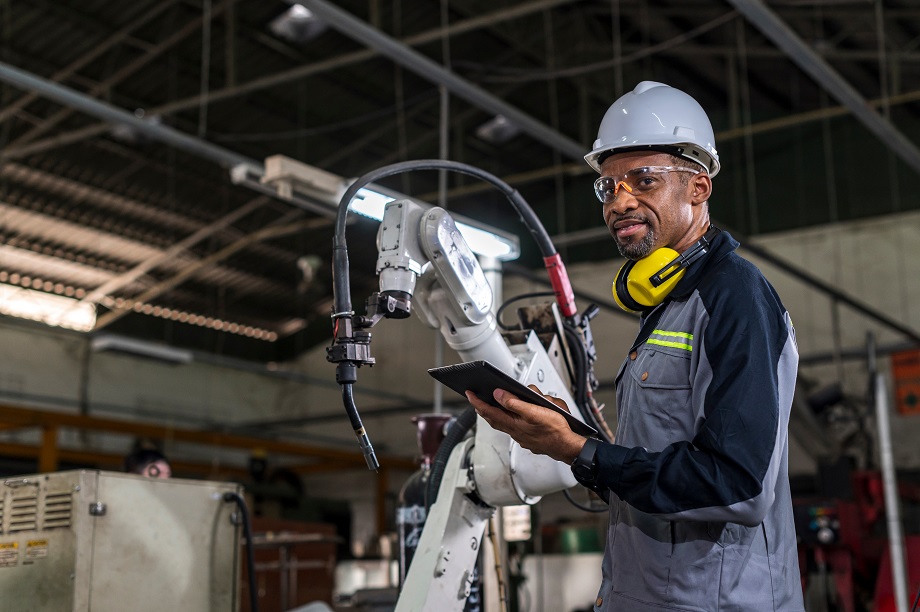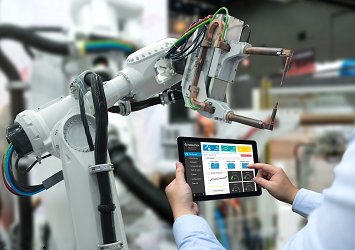
The Internet of Things (IoT) and artificial intelligence (AI) play a strong role in transforming traditional factories into smart factories in Industry 4.0. They use networks of interconnected sensors, devices, and software to monitor and optimize production processes. Technicians use them to create efficiency, improve safety, reduce costs, and control waste. The impact of IoT and AI on industrial automation is far-reaching on a global scale. The following impacts on industrial automation are revolutionizing factories and processing plants. Contact ITI Technical College today to learn more about IoT and AI industrial automation.
Predictive Maintenance In IoT And AI Industrial Automation
 The IoT has predictive maintenance applications in smart factories that can prevent machine and equipment failures and extend the life of machinery and equipment. Predictive maintenance can minimize equipment downtime and increase productivity in the production process. Data and analytics are used to estimate the repair time of equipment.
The IoT has predictive maintenance applications in smart factories that can prevent machine and equipment failures and extend the life of machinery and equipment. Predictive maintenance can minimize equipment downtime and increase productivity in the production process. Data and analytics are used to estimate the repair time of equipment.
- IoT and AI continuously monitor the health of production equipment
- They identify potential failures before they occur
- Maintenance schedules are optimized with these technologies
- Variables, such as temperature, vibration, and energy usage are communicated
Safety In Industrial Automation Settings
IoT And AI can provide an extensive overview of a factory’s environment to enhance workplace safety and health by pinpointing potential hazards and alerting managers and workers to the dangers. These technologies can also ensure that workers are following safety protocols and hazards and accidents are addressed quickly. Other safety applications include:
- Sensors continuously monitor conditions to alert workers before accidents occur
- IoT-enabled wearable devices monitor workers’ vital signs for stress or fatigue
- Safety analytics identify patterns and trends to improve safety procedures
Asset Tracking Is Crucial To Production Effectiveness
IoT is used in Industry 4.0 smart factory control systems to track the position and state of assets, such as tools, devices, machinery, and raw materials in real-time. Older factory technologies lacked these critical detections. The benefits include:
- Asset tracking optimizes production workflows and increases asset lifespan
- Optimizes the supply chain and manufacturing processes
- Gains better visibility into operations and improve productivity and profitability
- Alert technicians when it may be time to replace older machinery
Inventory Management With IoT And AI Industrial Automation
IoT and AI technologies are used to optimize inventory management in smart factories. The benefits include reducing costs, improving efficiency, and providing real-time observance of inventory levels when to reorder, and inventory movements.
Automated replenishment of inventory is achieved by alerting technicians when stock levels fall below a certain quantity. This reduces the need for human intervention and ensures inventory levels are optimized. IoT sensors and data analytics are used to predict future demand of stocks to reduce waste.
|
“The Internet of Things (IoT) and artificial intelligence (AI) play a strong role in transforming traditional factories into smart factories in Industry 4.0.” |
IoT And AI Industrial Automation Optimize Quality Control
IoT and AI sensors can detect defects in components and products in real-time and alert workers to take corrective action. Any variations in quality can be detected as they move through the production lines. Parts or products can be reworked or rejected before they are sent out of the factory.
Integrating sensors, devices, and machines into a network collects and analyzes data in real-time to provide more control of production and quality issues. IoT devices can be used to perform material quality testing in real-time. IoT is also used to track products through production and provide a detailed history of each item.
Production Process Monitoring
IoT and AI industrial automation process monitoring help ensure quality enhancements of parts and products. Data is leveraged from connected devices and sensors to optimize production, reduce downtime, and improve product quality. Monitoring further enhances the efficiency and profitability of part manufacturing.
IoT sensors and devices collect data from production lines and equipment to track key performance indicators such as output, machine utilization, and product quality. Technicians can quickly identify bottlenecks, inefficiencies, defects, breakdowns, and other issues that affect the production process.
Energy Efficiency In Industry 4.0
Manufacturers can obtain real-time data on energy usage and consumption patterns by using IoT sensors to monitor and optimize energy efficiency. Areas where energy efficiency can be improved are identified to help reduce costs and lower the carbon footprint include:
- IoT sensors monitor and identify areas of inefficiency and needed improvement
- Automated controls create more efficiency in different departments and systems
- IoT and AI help integrate renewable energy sources in the factory
- Smart devices are used to control lighting to match the tasks being performed
- Energy-efficient HVAC systems can optimize heating, cooling, and ventilation
- Energy storage systems can be managed to reduce costs.
Supply Chain Optimization
 Factories and suppliers use IoT and AI-enabled tracking devices to monitor shipments and deliveries in real-time. Delivery times and locations are identified to analyze and optimize the supply chain in factories and processing plants. As an example, radio frequency identification (RFID) tags are used to obtain accurate data from the parts and products. This process allows supply chain managers to monitor and identify the status and location of their inventories in real-time to ensure timely delivery of their shipments.
Factories and suppliers use IoT and AI-enabled tracking devices to monitor shipments and deliveries in real-time. Delivery times and locations are identified to analyze and optimize the supply chain in factories and processing plants. As an example, radio frequency identification (RFID) tags are used to obtain accurate data from the parts and products. This process allows supply chain managers to monitor and identify the status and location of their inventories in real-time to ensure timely delivery of their shipments.
In conclusion, IoT and AI control systems have many positive and effective direct impacts on industrial automation. Learn more about the Instrument & Control Systems Technology (AOS) Associate In Occupational Studies Degree by requesting information from ITI Technical College in Baton Rouge. We want to be your school of choice.
For more information about graduation rates, the median debt of students who completed the program, and other important information, please visit our website: https://iticollege.edu/disclosures/


